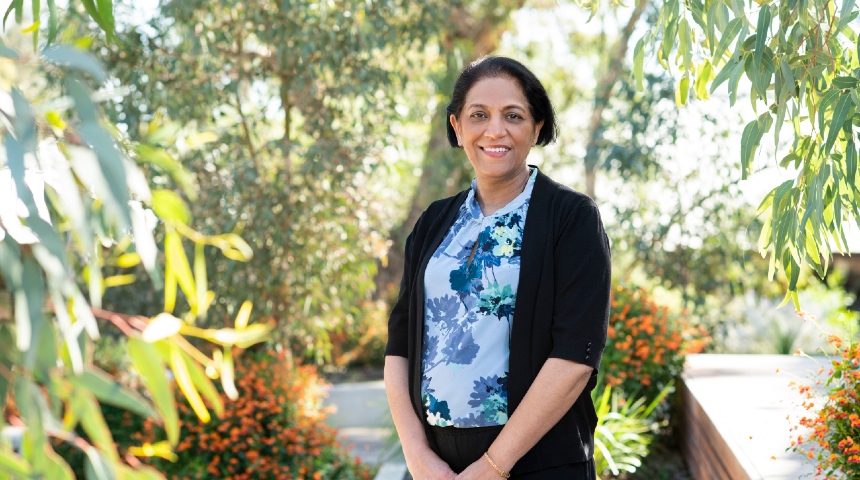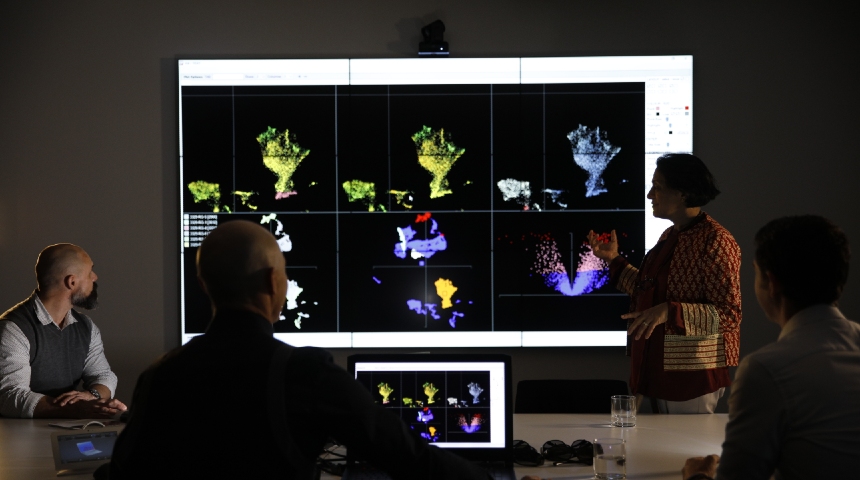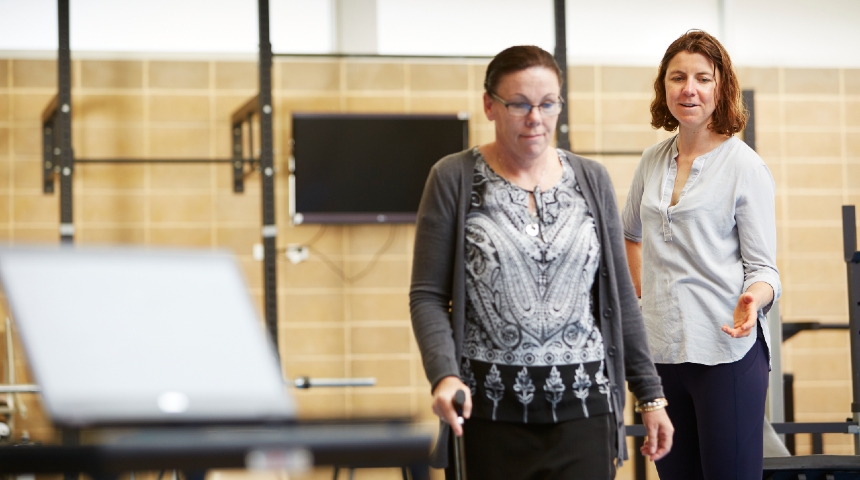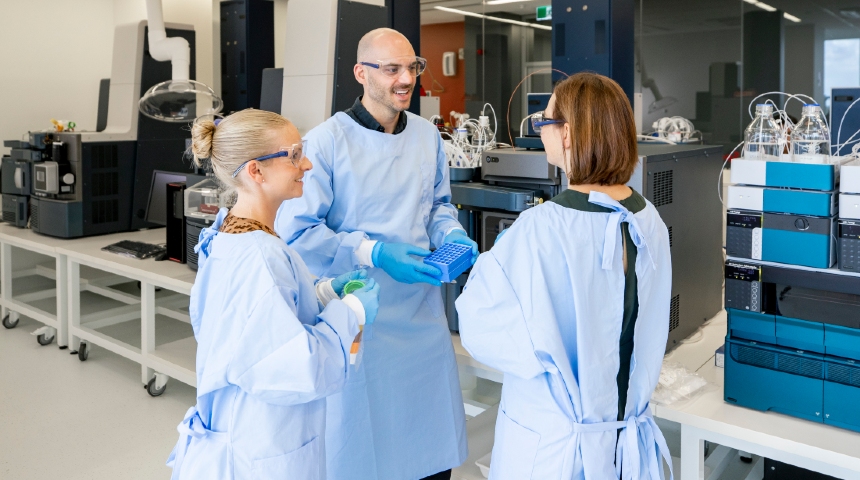
Scientists around the world are urgently working to understand and mitigate the threat posed by COVID-19. Hear from three female researchers at the cutting edge of that research.
“Medical and health science can be inspirational,” said Dr Yvonne Learmonth, who is looking into the impact of COVID-19 and other health crises on people living with neurological conditions.“From understanding genetics and why everyone in my family has blue eyes and how that links with some children being born with a particular disease, to helping people with cancer, neurological conditions or pain improve their quality of life, health science is critical to our understanding of life and a positive future.”
This sentiment is shared with colleagues Associate Professor Abha Chopra and Dr Samantha Lodge, who, while all in different areas of health science, are helping navigate a path out of the pandemic.
Here, we explore their research and inspiration.
Exploring how genetics shape the virus
Dr Abha Chopra
As COVID-19 is constantly changing with new strains being borne, understanding both the virus and our genetic interactions with it is an important step to identify new prevention and diagnostic techniques.“One of the biggest obstacles to tackling a changing virus is the race against time,” said Dr Chopra, who leads research and development at Murdoch’s Genomics Core Research Facility.
“In our lab, we examine thousands of COVID-19 samples each day. Then we use bioinformatic tools to provide research partners with compact visual datasets for analysis.”
This data is helping researchers around the world identify genetic markers that may help to predict the severity of COVID-19 infections, as well as informing potential vaccination strategies and screening tests.
 Image caption: Dr Chopra presenting data visualisations at the Genomics Core Research Facility
Image caption: Dr Chopra presenting data visualisations at the Genomics Core Research Facility“We are fortunate to have experience in this field, which has equipped the unique facility at Murdoch to rapidly handle the influx of COVID-19 research projects,” says Dr Chopra.
“Ultimately, understanding how a person’s genes are interacting with the virus can help predict how they are likely to handle the infection and the effectiveness of potential vaccines.”
“One of the most significant findings from our initial analysis of COVID-19 sequence data was that the virus has been mutating as it moves from one country to another.”
While COVID-19 has caused serious implications for global health and economy, Dr Chopra said one of the better things to come out of the pandemic is seeing the whole scientific community come together.
“This has never happened with any other diseases, with research often operating in silos. Our world is extremely connected today, so we can see firsthand how COVID-19 is affecting everyone, everywhere regardless of where you live, your economic status or ethnicity,” she said.
“Together, we hope to continue advancing our medical and scientific knowledge in global healthcare.”
Supporting those isolated by the virus
Dr Yvonne Learmonth
Dr Learmonth is a physiotherapist and researcher who is exploring how Australians are coping with multiple devastating crises, from mass flooding and bushfires to the pandemic now gripping the globe.“We already knew that people living with neurological conditions are disproportionally affected during crises; they are more likely to have reduced access to care and may suffer from more significant consequences,” explained Dr Learmonth.
“Our research, which began last year and continues with funding from MS Research Australia, explores the burden of crises on the health behaviours, access to healthcare and emergency planning needs among Australians with multiple sclerosis.”
The project, Crisis Resilience in MS, draws on multiple areas of social and medical science with experts in psychology, counselling, medicine, rehabilitation, public health and epidemiology.
 Image caption: Dr Learmonth guiding a patient through physiotherapy exercises
Image caption: Dr Learmonth guiding a patient through physiotherapy exercisesThe findings will help understand how best to prepare the healthcare system to help people living with MS and similar health conditions during crises.
“At present there are no formal recommendations in place to guide management of people living with MS in times of crisis,” said Dr Learmonth.
“We hope to inform government, local authorities, disability charities, healthcare providers, carers and most importantly people living with MS how to be better prepared in the future when life takes an unpredictable turn.”
As well as assisting people with MS, it is anticipated the research will be useful for people living with disability from other conditions and be refined to their specific needs.
“Building crisis resilience for people living with MS is our core focus, but the opportunity to broaden the impact of this research across the wider community is also really exciting.”
Unravelling the long-term implications
Dr Samantha Lodge
When COVID-19 first arose, it was believed to be a respiratory disease. However, Dr Lodge and the team at the Australian National Phenome Centre have shown it is much more than that – a multisystemic disease affecting many organs, from the kidneys, to the liver and the brain.“Different metabolic markers can give an insight into which parts of the body are affected by any given disease and how severely they are impacted,” explained Dr Lodge.
“My research involves using what’s called ‘Nuclear Magnetic Resonance’ technology to analyse COVID-19 blood samples to understand the biochemical changes in the body from having the disease.”
Dr Lodge says the most exciting work has been the development of a new covid-19 diagnostic that can detect the disease whether someone is asymptomatic or severely impacted.
“This is critically important as the current PCR test appears to be only 70% accurate. The other benefit is this new NMR test can be used to follow the longitudinal recovery from the disease.”
 Image caption: Dr Lodge in discussion with Dr Torben Kimhofer and Dr Nicola Gray Whiley inside the ANPC laboratory
Image caption: Dr Lodge in discussion with Dr Torben Kimhofer and Dr Nicola Gray Whiley inside the ANPC laboratoryIn addition to detecting and analysing the effects of the disease while active in the body, Dr Lodge and the team at the ANPC continue work to understand the long-term effects of contracting COVID-19.
“It is believed that many people that have had the disease suffer what we call ‘long covid’,” said Dr Lodge.
“Within the laboratory we are finding that six months post infection, a large number of individuals still suffer the effects of the disease, with their blood biochemistry still demonstrating they have not returned to a ‘normal’ state.
The team we will continue to follow up cohorts of patients from Australia and throughout the world to understand the full lasting effects of the disease.
“It’s a huge body of work and one of that I’m proud to be playing a role it,” said Dr Lodge.
Advice for other young scientists
“If you want a career where every day is different and dynamic then go for it!” said Dr Lodge.
“In the world of science and research, as you answer key questions many more arise, so you have to be good at adapting and changing to the different research situations.”
The key to enjoying those changing situations is to identify a subject that you’re passionate about, according to Dr Learmonth.
“Find whatever topic or question is most important to you, run to catch it and hold on to it with both hands. If you can help others along the way, your career in science and medicine will always be rewarding and fun.”
Dr Chopra says that even if you don’t see yourself as a scientist, the communication, fact-checking, lateral thinking and resilience that science teaches is useful in any career.
“I recommend that even if you are not studying a science degree, taking just one or two science subjects during university can open up many career pathways.
“I would also encourage you to find a mentor who inspires you and be open to paths that you didn't initially expect - you never know what exciting doors await along the journey!”
This research supports the United Nations Sustainable Development Goal 3 to ensure healthy lives and promote well-being for all at all ages.
